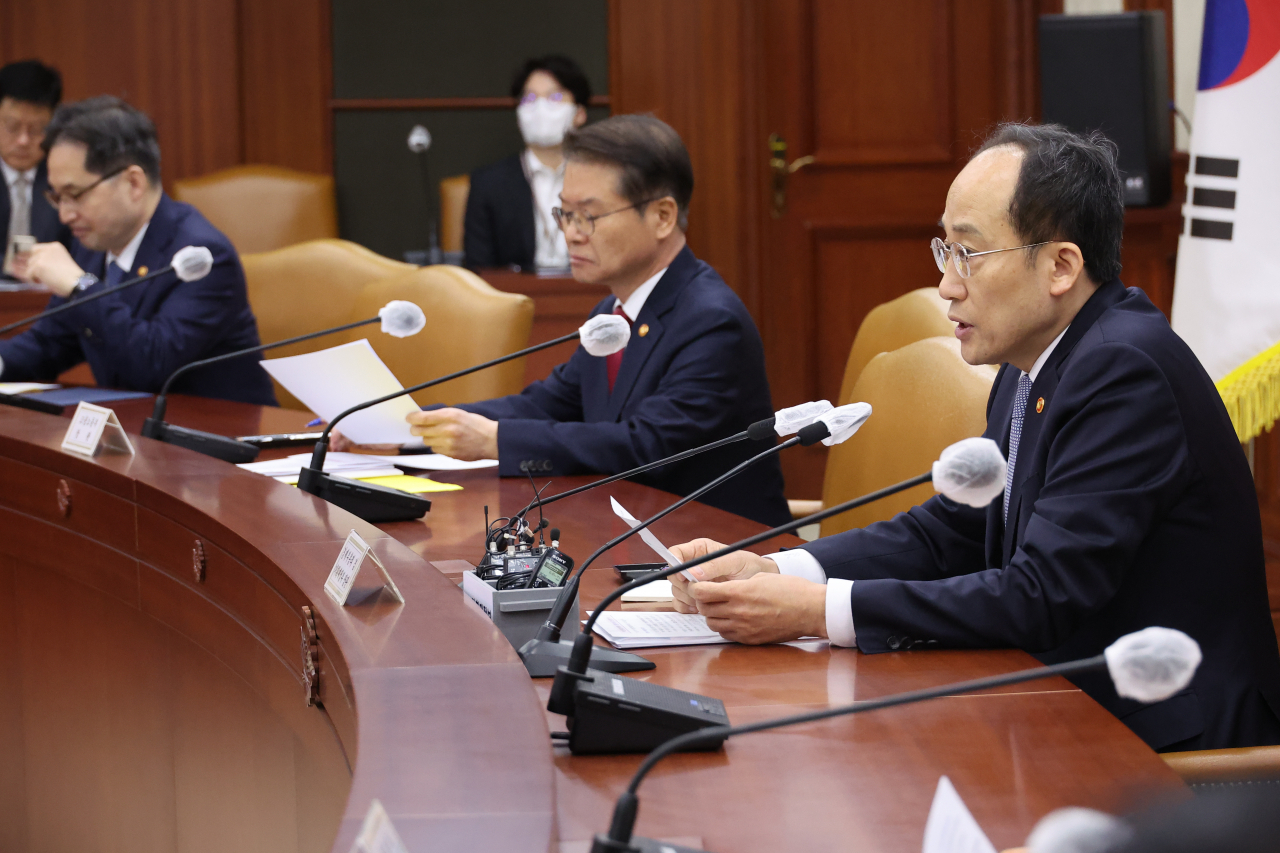Market Now
Finance Minister confident inflation will soon cool off
 |
Finance Minister Choo Kyung-ho speaks during an emergency meeting of economy-related ministers at the government complex in Seoul on Monday. (Yonhap) |
South Korea's efforts to combat high inflation are showing signs of progress as consumer prices marked their smallest on-year increase in February in nearly 10 months, according to Statistics Korea on Monday.
The consumer price index, a key indication of inflation, rose by 4.8 percent on-year last month, marking a drop of 0.4 percentage point from 5.2 percent in January. It is the first time since April 2022 (4.8 percent) that the figure has fallen below 5 percent.
“The consumer prices index is on a slowdown,” Finance Minister Choo Kyung-ho said at an emergency meeting of economy-related ministers at the government complex in Seoul on Monday. “Concerns remain, but barring any unexpected external shocks, the slowdown will be clearer as we move forward.”
The figure had remained in the 5 percent range over the past few months. Authorities assessed that inflation had passed its peak when the CPI hit a 6.3 percent high in July.
Slowing inflation has brought relief to consumers, yet concerns remain amid price hikes in public utility charges.
The price of utilities, including electricity, gas and water, increased by 28.4 percent on-year in February, hitting a record high since data was compiled in 2010.
It showed a slight increase from the 28.3 percent growth tallied in January, as some local government bodies raised fees for water utilities.
The government is working on controlling public utility charges to tame inflation.
“We will maintain the stance to freeze public utility charges during the first half of the year to minimize the burden,” Choo said. “The government is also doing its best to stabilize major food prices by cutting the duties for raw food ingredients.”
The fall of the CPI in February stems from the drop in prices for oil and livestock products. Oil prices fell by 1.1 percent while livestock product prices fell by 2 percent.
The core CPI, excluding volatile food and oil prices, went up by 4 percent on-year, less than the 4.1 percent increase from a month before. The CPI for daily necessities rose by 5.5 percent.
The Bank of Korea projected the consumer price index will continue to drop this month.
“The increase in consumer prices may fall significantly in March from the base effects of the hikes in international oil prices shown last year,” BOK Deputy Gov. Lee Hwan-seok said at a separate meeting, referring to the 13.8 percent rise in oil prices in March 2022, following Russia’s invasion of Ukraine.
Though figures are presenting a positive outlook, inflation is yet to be fully resolved, still remaining well above the 2 percent target set by the Bank of Korea.
"Consumer prices will continue to slow down, while showing an upward trend, surpassing the 2 percent target range," Lee said. "Volatility is high for prices, with concerns related to international oil prices, economy in and out of Korea, timing and range of public utility charges and more."
Concerns on oil prices remain with China's easing of COVID-19 restrictions.
"Volatility for consumer prices remains high with international prices for raw materials increasing following China’s reopening," an official from Statistics Korea said.
By Im Eun--byel (silverstar@heraldcorp.com)



![[Global Finance Awards] Mirae Asset Securities' global top-tier ambition within reach](http://res.heraldm.com/phpwas/restmb_idxmake.php?idx=151&simg=/content/image/2024/11/27/20241127050077_0.jpg)
![[Global Finance Awards] Kyobo Life enhances insurance coverage for cancer, long-term care](http://res.heraldm.com/phpwas/restmb_idxmake.php?idx=151&simg=/content/image/2024/11/26/20241126050106_0.jpg)
![[Global Finance Awards] Kakao Bank bolsters SE Asia foray with Superbank partnership](http://res.heraldm.com/phpwas/restmb_idxmake.php?idx=151&simg=/content/image/2024/11/27/20241127050076_0.jpg)
![[Global Finance Awards] IBK boosts support for small businesses](http://res.heraldm.com/phpwas/restmb_idxmake.php?idx=151&simg=/content/image/2024/11/27/20241127050072_0.jpg)
![[Global Finance Awards] Shinhan chief pushes to boost corporate value](http://res.heraldm.com/phpwas/restmb_idxmake.php?idx=151&simg=/content/image/2024/11/27/20241127050074_0.jpg)
